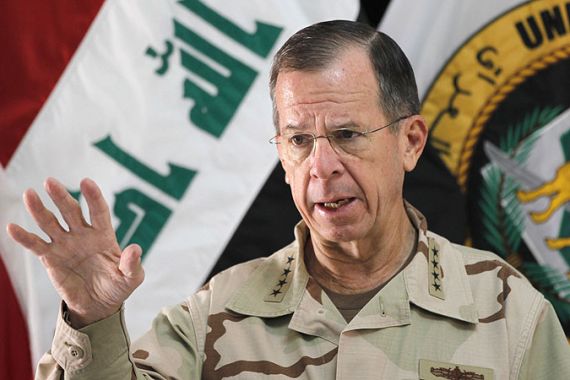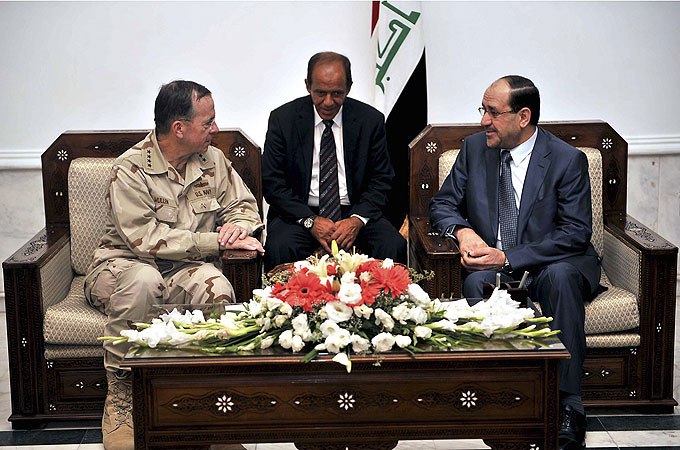US urges ‘quick Iraq decision’ on troop stay
Mullen says his forces must be given immunity from prosecution as Baghdad politicians hold talks on US withdrawal.

 |
| Mullen says the Iraqi president and prime minister have promised to quickly consider the US offer [Reuters] |
Admiral Mike Mullen, the US military chief, has said Iraq must decide as soon as possible whether it wants US troops to stay in the country, and also whether to include provisions on immunity for US soldiers.
Iraqi political leaders are meeting in Baghdad to discuss whether to keep US troops in the country beyond a December 31 deadline.
Mullen, the outgoing chairman of the Joint Chiefs of Staff, said on Tuesday in the Iraqi capital that US troops must be given immunity from prosecution as part of any agreement to keep them in Iraq and that this protection must be approved by the country’s parliament.
After talks on Monday evening with Nouri al-Maliki, the prime minister, and President Jalal Talabani, Mullen said he was confident they were aware of the urgency of the issue, but added that they faced internal political challenges to reach a deal.
“Time is quickly running out for us to be able to consider any other course,” Mullen said at the US military’s Victory Base Camp on the outskirts of Baghdad.
Mullen and other US officials have been pushing Iraq to decide whether they would want additional American forces to stay in the country past their departure date, and the immunity issue has been one of the key sticking points.
“An agreement, which would include privileges and immunities for our American men and women in uniform will need to go through the Council of Representatives [Iraqi parliament],” he said.
Mullen said in Baghdad that Talabani and al-Maliki had both promised to consider the offer quickly.
“A significant part of this is just a physics problem. You get to a point in time where you just can’t turn back and all the troops must leave. That’s why it’s so important to make the decision absolutely as soon as possible,” he said.
Al Jazeera correspondent Jane Arraf, reporting from Baghdad, said: “There’s lack of clarity so far on the issue of whether US troops should stay.
“Essentially what Mullen is talking about is an agreement to ask the US to start negotiations and not an agreement to ask US troops to stay.”
US troops unpopular
US officials have said repeatedly that they need to know soon whether Iraq wants them to stay longer so they can figure out which of their forces must stay and which must go.
Right now, about 46,000 US forces remain in the country, but their departure will gain momentum this autumn onwards.
The US has offered to let up to 10,000 US troops stay for training Iraqi forces on tanks, fighter jets and other military equipment.
But Iraqi politicians and government officials have been undecided about taking a public stand on whether they want American forces to stay or go.
The troops are still unpopular with many Iraqis who are tired of eight years of war, and Muqtada al-Sadr, the Shia Muslim leader, who is one of Maliki’s important allies, has made it his mission to drive them from the country, leaving the prime minister in a tough position.
Maliki said in a statement on his website late on Monday that he hoped Iraqi political blocs would be able to reach a consensus on Tuesday night when they are expected to meet.
He stressed that regardless of the decision on US troops, he wanted the two countries to continue co-operation, especially in the area of air defence.
Violence increased
Meanwhile, a car parked outside a church in Baghdad exploded injuring up to 23 people, including five worshipers.
“Level of violence has increased compared to last year, and Mullen’s comment that northern Iraqi city of Mosul, which is still violent, was “peaceful and prosperous” is a news to a lot of Iraqis,” our correspondent said.
“We have to remember though, senior US officials don’t get out on the ground most often,” she said.
“There is quite a large difference between people concerned that there is not real stability so far and US military officials, who say compared to bad dark days of civil war things are pretty good.”